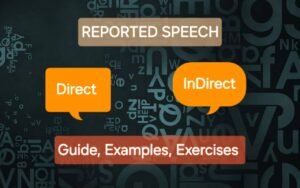Tenses : Rules, Types, and Examples for Students – Practice Test
Select Your Practice Test- Choose Your Difficult Level
Easy – Class 6 & Class 7 – Intermediate – Class 7 & Class 8 – Hard – Class 9 & Class 10
MCQ Test, Self Assessment
| Chapter | Test Type |
|---|---|
| Easy | |
| Intermediate | |
| Hard | |
| Hard 1 |
🔹 TENSES IN ENGLISH GRAMMAR
English tenses are divided into 3 main time frames:
- Present
- Past
- Future
Each of these has 4 aspects:
- Simple
- Continuous (Progressive)
- Perfect
- Perfect Continuous
🔸 1. PRESENT TENSES
a) Simple Present
- Structure:
- Positive: Subject + base verb (add s/es for he/she/it)
- Negative: Subject + do/does + not + base verb
- Question: Do/Does + subject + base verb?
- Use: Habits, facts, general truths
- Example:
- She goes to school every day.
- I do not like coffee.
- Do you play football?
b) Present Continuous
- Structure:
- Positive: Subject + am/is/are + verb-ing
- Negative: Subject + am/is/are + not + verb-ing
- Question: Am/Is/Are + subject + verb-ing?
- Use: Actions happening now or temporary actions
- Example:
- I am studying now.
- She is not watching TV.
- Are they playing outside?
c) Present Perfect
- Structure:
- Positive: Subject + has/have + past participle
- Negative: Subject + has/have + not + past participle
- Question: Has/Have + subject + past participle?
- Use: Actions that happened at an unspecified time or just completed
- Example:
- He has finished his work.
- I have not seen that movie.
- Have you eaten lunch?
d) Present Perfect Continuous
- Structure:
- Positive: Subject + has/have + been + verb-ing
- Negative: Subject + has/have + not + been + verb-ing
- Question: Has/Have + subject + been + verb-ing?
- Use: Actions started in the past and still continuing
- Example:
- They have been working for 3 hours.
- She has not been feeling well.
- Have you been studying all day?
🔸 2. PAST TENSES
a) Simple Past
- Structure:
- Positive: Subject + past verb
- Negative: Subject + did not + base verb
- Question: Did + subject + base verb?
- Use: Completed actions in the past
- Example:
- I visited Paris last year.
- He did not go to school.
- Did you see the movie?
b) Past Continuous
- Structure:
- Positive: Subject + was/were + verb-ing
- Negative: Subject + was/were + not + verb-ing
- Question: Was/Were + subject + verb-ing?
- Use: Ongoing actions at a specific time in the past
- Example:
- She was reading a book at 8 PM.
- They were not listening.
- Were you watching the match?
c) Past Perfect
- Structure:
- Positive: Subject + had + past participle
- Negative: Subject + had + not + past participle
- Question: Had + subject + past participle?
- Use: Action that happened before another action in the past
- Example:
- I had eaten before he came.
- She had not finished her work.
- Had they arrived?
d) Past Perfect Continuous
- Structure:
- Positive: Subject + had + been + verb-ing
- Negative: Subject + had + not + been + verb-ing
- Question: Had + subject + been + verb-ing?
- Use: Action that was ongoing before another past event
- Example:
- He had been working all day.
- We had not been sleeping.
- Had you been waiting long?
🔸 3. FUTURE TENSES
a) Simple Future
- Structure:
- Positive: Subject + will + base verb
- Negative: Subject + will not + base verb
- Question: Will + subject + base verb?
- Use: Promises, predictions, decisions made at the moment
- Example:
- I will help you.
- She will not come tomorrow.
- Will you call me?
b) Future Continuous
- Structure:
- Positive: Subject + will be + verb-ing
- Negative: Subject + will not be + verb-ing
- Question: Will + subject + be + verb-ing?
- Use: Ongoing actions in the future
- Example:
- We will be traveling at this time tomorrow.
- He will not be staying there.
- Will she be waiting for us?
c) Future Perfect
- Structure:
- Positive: Subject + will have + past participle
- Negative: Subject + will not have + past participle
- Question: Will + subject + have + past participle?
- Use: Completed action before a certain future time
- Example:
- By 10 AM, I will have finished the work.
- He will not have arrived by then.
- Will they have left?
d) Future Perfect Continuous
- Structure:
- Positive: Subject + will have been + verb-ing
- Negative: Subject + will not have been + verb-ing
- Question: Will + subject + have been + verb-ing?
- Use: Ongoing action continuing up to a point in the future
- Example:
- By next month, she will have been working here for 5 years.
- I will not have been waiting long.
- Will he have been studying all day?


